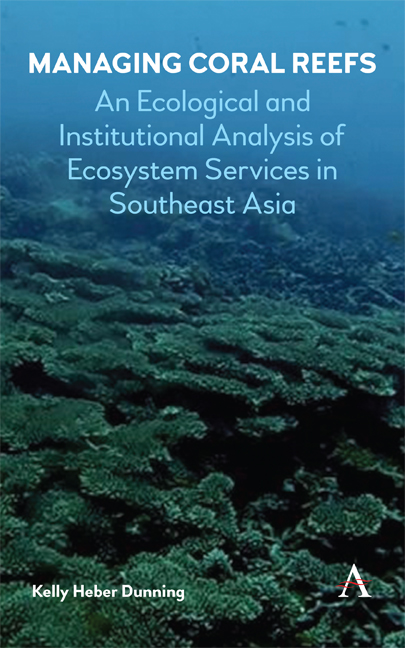 Managing Coral Reefs
Managing Coral Reefs Book contents
- Frontmatter
- Contents
- List of Figures
- List of Tables
- Acknowledgments
- List of Abbreviations
- 1 Introduction
- 2 Theory, Practice and Policy Context of Coral Reef Management
- 3 Governing Natural Resources in Indonesia and Malaysia
- 4 Case Study Sites and the Coral Triangle
- 5 Integrated Management of Marine Protected Areas
- 6 Legitimate Marine Protected Areas
- 7 Adaptive Capacity of Marine Protected Areas
- 8 Policy Recommendations for Marine Protected Area Management in Developing Countries
- Appendix A Research Design
- Appendix B Data and Methods
- Appendix C Coral Cover Results
- References
- Index
3 - Governing Natural Resources in Indonesia and Malaysia
Published online by Cambridge University Press: 16 August 2018
- Frontmatter
- Contents
- List of Figures
- List of Tables
- Acknowledgments
- List of Abbreviations
- 1 Introduction
- 2 Theory, Practice and Policy Context of Coral Reef Management
- 3 Governing Natural Resources in Indonesia and Malaysia
- 4 Case Study Sites and the Coral Triangle
- 5 Integrated Management of Marine Protected Areas
- 6 Legitimate Marine Protected Areas
- 7 Adaptive Capacity of Marine Protected Areas
- 8 Policy Recommendations for Marine Protected Area Management in Developing Countries
- Appendix A Research Design
- Appendix B Data and Methods
- Appendix C Coral Cover Results
- References
- Index
Summary
Indonesia's Road to Decentralization
Indonesia is currently expanding its network of co-managed marine protected areas (MPAs) to supplement its preexisting network of centrally managed marine parks. This decentralized approach to ecological management is a product of the country's colonial and postcolonial political history. In the last 30 years, Indonesia has devolved significant responsibilities to local communities while continuing to maintain national parks.
Although they are not the focus of this book, some attentionmust be paid to the centrally managed MPAs in Indonesian waters that are known worldwide by divers and coral reef experts for their high levels of biodiversity and coral cover. In recent years due to their popularity, the agency responsible for tourism in Indonesia has begun to market these parks as the “Magnificent Seven,” and they include The Thousand Islands, Karimunjawa,Wakatobi, Taka Bonerate, Bunaken, Togean and Cendrawasih.
Colonial legacies and changing governance
The story of how natural resources are managed in Indonesia begin in precolonial times. However, the very idea of a unified Indonesian government is actually a recent one, with the notion of a unified nation state first appearing under a nationalist movement that began in the 1920s.
Prior to the Dutch colonial era, Indonesian natural resource management focused on extraction and it varied from island to island. For example, early Indonesian kingdoms such as Mataram in Java and Srivijaya in modern-day Sumatra had a highly centralized natural resource management policy during the “Golden Era” of Indonesian history spanning 1–1500 CE. Rulers oversaw strict hierarchical, feudalist-style systems that directed the peasantry to conduct forest harvests without limits (Brown 2003; Bourchier and Hadiz 2014).
The dominance of these decentralized kingdoms, or the early kingdoms described above, continued until the Dutch colonial era. Dutch colonization occurred through its East India Company (VOC) for the purpose of extracting, exporting and holding a monopoly over Indonesian natural resources including spices, minerals and mining resources. The colonial era began in the early 1600s with the establishment of modern-day Jakarta, known then as Batavia, in 1610 (Thorburn 2002). The Dutch were able to centralize governance effectively on Java by the 1830s.
- Type
- Chapter
- Information
- Managing Coral ReefsAn Ecological and Institutional Analysis of Ecosystem Services in Southeast Asia, pp. 25 - 34Publisher: Anthem PressPrint publication year: 2018


